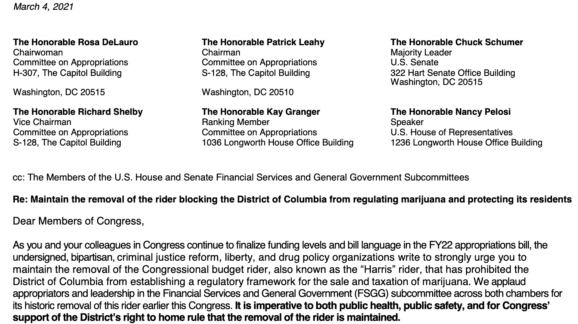CEI Joins Coalition Urging Congress to End Ban on DC Marijuana Sales
Dear Members of Congress,
As you and your colleagues in Congress continue to finalize funding levels and bill language in the FY22 appropriations bill, the undersigned, bipartisan, criminal justice reform, liberty, and drug policy organizations write to strongly urge you to maintain the removal of the Congressional budget rider, also known as the “Harris” rider, that has prohibited the District of Columbia from establishing a regulatory framework for the sale and taxation of marijuana. We applaud appropriators and leadership in the Financial Services and General Government (FSGG) subcommittee across both chambers for its historic removal of this ride rear lier this Congress. It is imperative to both public health, public safety, and for Congress’ support of the District’s right to home rule that the removal of the rider is maintained.
The District of Columbia is one of 19 jurisdictions that has allowed for access to marijuana for adult use. Yet, because the District is not a state, it is the only jurisdiction that cannot regulate marijuana sales. Congress and the Department of Justice have allowed other states like Alaska, Colorado, Oregon, Washington, and California, among others, to exercise their sovereign right to set policy and function as laboratories of democracy; the District of Columbia should be allowed to use local taxpayers’ funds to support local needs as well.
Like many residents of states around the nation, concerned residents of the District of Columbia voted to legalize marijuana for adult use in 2014 with nearly 65% voter support. Yet, due to the existence of the Harris rider in prior appropriations bills–every year since the successful passage of Initiative 71–the District of Columbia remains the only jurisdiction in the country that cannot regulate marijuana sales or fruitfully tap into the public health and safety benefits of legalization. Delroy Burton, the former chairman of the D.C. Fraternal Order of Police, said a regulated market would have “pulled the teeth out of the illegal drug trade” eventually wiping out the violence associated with it. Without the ability to regulate marijuana sales, the grey market for marijuana flourishes despite the need and want of the District leadership and residents alike to establish a regulatory model. Such a model would free up law enforcement resources to focus on real threats to public safety. It would also allow legitimate entrepreneurs to start businesses, create jobs and spur economic development in theDistrict.It is of utmost importance that the District of Columbia be granted the same capacity as states around the nation that have voted to regulate adult use of marijuana and deliver on the promises of Initiative 71.
There has been tremendous progress regarding marijuana reform on both the federal and state level. Both in Congress and nationally, the public conversation has shifted from “should we legalize marijuana?” to “how should we legalize marijuana?” From 2000 to 2019, the share of Americans saying marijuana should be legal more than doubled. A November 2021Gallup poll reports that 68% of Americans support marijuana legalization, including 50% of Republicans.
The District of Columbia’s initiative was an important step toward reducing racial disparities in the criminal justice system. A 2013 report found that nine out of 10 drug arrests in Washington D.C. were of African Americans from 2009-2011. Marijuana law violations are the lead category of drug arrests with simple possession representing six out of 10 drug arrests. Despite equal rates of use, African Americans in the District disproportionately carried the brunt of marijuana criminalization and over enforcement. Residents of the District voted to regulate marijuana in light of these disparities. There are nearly 700,000 residents living in the District of Columbia; Congress should follow the spirit of the Home Rule Act, and allow them to set their own local laws. It is time for Congress to support the District of Columbia’s right to self-determination and lift the rider prohibiting them from regulating marijuana.
For these reasons, we respectfully request that any FY22 spending bill maintain the omission of the Harris rider and adhere to the wishes of nearly 700,000 District residents –as the cardinals of FSGG subcommittee did earlier this Congress.
We look forward to working together to fulfill our longstanding and shared commitment to protecting and expanding the rights of residents of the District of Columbia. Please contact Queen Adesuyi, Senior National Policy Manager at the Drug Policy Alliance, with any questions, at [email protected] or 202-810-1481.
Sincerely,
ACLU of the District of Columbia
American Civil Liberties Union
Anacostia Coordinating Council
BOWL PAC
Bud Appetit
Center for Disability Rights
Charm City Care Connection
Competitive Enterprise Institute
CURE-DC
The Daniel Initiative
DC Cannabis Business Association
DC Caucus For Returning Citizens
DC DanceSafe
DC forDemocracy
DC Justice Lab
DC Marijuana Justice (DCMJ)
DC NORML
DC Vote Doctors for Cannabis Regulation
Dr. Bronner’s Drug Policy Alliance
Health Care for the Homeless
Health in Justice Action Lab
HIPS
Interfaith Action for Human Rights
International CURE
Jane’s List Political Action Committee
Law Enforcement Action Partnership
The Leadership Conference on Civil and Human Rights
National Association of Social Workers
National Cannabis Industry Association
National Employment Law Project
Neighbors United for DC Statehood
NORML
Our Revolution
Plant Medicine Coalition
Public Justice Center
R Street Institute
The Sentencing Project
SPARC
StoptheDrugWar.org
Students for Sensible Drug Policy
The Taifa Group
United Food and Commercial Workers Local 400
Voices for Progress
Washington Office on Latin America (WOLA)
